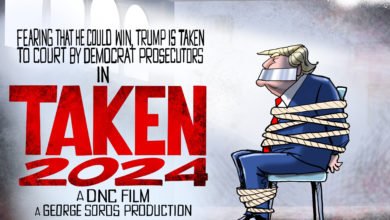Eroding the Electoral College Erodes Americans’ Voting Rights
The structure of the American government was designed by the Founders to prevent raw majoritarianism: the three branches of government and their checks and balances, the allocation of power between the state and federal governments, constitutional limits on the federal government’s power, the differing composition of the U.S. House of Representatives and the U.S. Senate, and the Electoral College.
Leftists are doing everything they can to eliminate these safeguards and create a system where a bare majority will control every level of political power. The Electoral College is a particular target of their vitriol and machinations.
The U.S. Constitution provides that the president of the United States is elected not by a popular vote of the people but by the states. Each state has electors, the number of which is equal to the number of representatives in the U.S. House of Representatives (which is determined by the state’s population, established every 10 years in the census). After a presidential election, each state’s electors cast their votes for the candidate who has won a majority of the state’s votes. (All but two states have a “winner-take-all” electoral vote system; Maine and Nebraska allocate electors roughly proportionately.) In theory, members of the Electoral College have the power to cast their votes for whichever candidate they choose. (And there have been loud calls for them to do so, in 2016 and again in 2020.) In practice, however, they have abided by the decision of the voters in their state.
The objection to the Electoral College arises largely from the fact that the victor in a presidential election can win despite losing the “popular vote,” as has happened five times in U.S. history, including the 2000 and 2016 elections. This is pitched as some kind of grave injustice. But the Electoral College was designed precisely to protect and preserve the votes and voices of smaller, rural, less populated states.
Opponents of the Electoral College also claim it was put in place to protect slavery. But a quick review of history disproves that. The Constitution was adopted in 1789. In 1790, at the time of the first census, the states in ascending order of population were Southwest Territory, Delaware, Rhode Island, Kentucky, Georgia, Vermont, Maine, New Hampshire, New Jersey, Connecticut, South Carolina, New York, Maryland, Massachusetts, North Carolina, Pennsylvania and Virginia. Of the 17 then-existing states, slave states were four of the top six most populous. Virginia alone held almost 20% of the country’s entire population. By contrast, the bottom nine least populated states — including New York — were free states.
In other words, at the time it was created, the Electoral College protected the voting rights of less populated free states vis-a-vis the votes of the larger states where slavery was practiced.
Eliminating the Electoral College altogether would require a constitutional amendment, a process requiring either a convention of the states or passage by a two-thirds majority of both houses of Congress followed by ratification by three-quarters of all state legislatures (38 out of 50 at present).
However, those trying to change the method of electing the president have found another way: the National Popular Vote Interstate Compact, which was launched in 2006. States join the NPVIC by passing legislation by which they agree to allocate their Electoral College votes to the presidential candidate who receives the largest percentage of the popular vote — even if that is not whom a majority of the state’s own voters have chosen.
This week, Maine became the 17th state to pass legislation joining the NPVIC. (The District of Columbia has also passed legislation joining.) At this writing, the compact has 209 of the 270 votes needed to trigger its application in a presidential election.
The legislatures that have passed NPVIC legislation have effectively disenfranchised their own citizens, who should be irate that their votes will be cast aside because of what has transpired in other states.
There are additional reasons to oppose the NPVIC.
President Joe Biden signed an executive order in 2021 ordering the U.S. Census Bureau to count all U.S. residents — including illegal immigrants — as part of the census. Since that time, at least 10 million people have crossed the border illegally — more than the populations of 40 states. Huge numbers of these have landed in California, New York and Illinois, bloating their population figures for both congressional representation and Electoral College purposes. California, Illinois and New York (all of which have joined the NPVIC) have 101 Electoral College votes just between the three of them. They are also in the top 10 states with the highest number of illegal immigrants.
This explains Democrats’ push to make all illegal immigrants citizens and give them voting rights. That, coupled with the NPVIC, would give the most populous states de facto control over presidential elections. A handful of states should not be able to decide the election of the president of all 50, particularly when they have padded their population via illegal immigration. Claims that the Electoral College “undermines democracy” are either ignorant or deliberately misleading. The United States is not a “democracy”; it is a constitutional republic. And it is not merely a country; it is also a federation of 50 semi-sovereign states, each of which has citizens.
NPVIC advocates, along with those who want to abolish the Electoral College outright and change the composition of the U.S. Senate, are pushing us toward a situation where a majority of states will nevertheless be home to a permanent, politically disenfranchised minority.
That is not a prescription for “fairness” or “unity.” It is a path to balkanization, calls for secession — or worse.
Agree/Disagree with the author(s)? Let them know in the comments below and be heard by 10’s of thousands of CDN readers each day!




